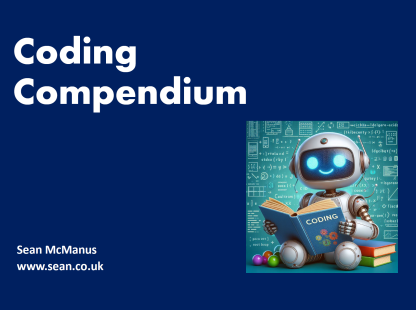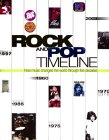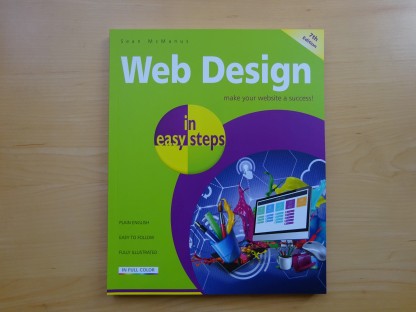
Coding Compendium
A free 100-page ebook collecting my projects and tutorials for Raspberry Pi, micro:bit, Scratch and Python. Simply join my newsletter to download it.
August 2003
How did bands start out promoting themselves on the internet?
 This history of bands online was written by Sean McManus while conducting research for the Rock & Pop Timeline book by Johnny Black, which presents a year by year history of the music industry, its stars and fashions. The article doesn't appear in the book in its original form, so I thought I'd share it with you here.
This history of bands online was written by Sean McManus while conducting research for the Rock & Pop Timeline book by Johnny Black, which presents a year by year history of the music industry, its stars and fashions. The article doesn't appear in the book in its original form, so I thought I'd share it with you here.
It's unlikely you've heard of The Ugly Mugs - even less likely you've caught yourself humming their song 'Cold turd on a paper plate' - but as internet visionaries, their place in history is assured. In 1993, band member Jeff Patterson spotted the potential of the internet to share the band's songs and set up the 'Internet Underground Music Archive' or IUMA for short at www.iuma.com. He was ahead of the game: businesses were just starting to notice the internet and it wasn't until 1994 that pioneering directory Yahoo was launched.
IUMA grew to support thousands of other bands and was the first of many sites with a similar philosophy. The new deal was that listeners could download new music for free and bands could find an audience without having to toady to major record labels or radio stations. And, in some cases, without having to be distinctive enough to grab their attention.
In 1996, Jay Barbieri set up J-Bird Records and used music-hungry web users as A&R men. Barbieri's background was at Angel, a division of EMI, where he was vice president of creative and production services. His ideas for J-Bird were to let website visitors pick the artists, to sign all-comers, and to make money by marketing a wide range of bands. The company lasted until 2002.
Throughout the late nineties and early noughties, many more websites launched with modern technology and hippy ideology to give away music. Many struggled to get any exposure and income as more and more free music - some from established acts - poured onto the web.
As websites grew from selling adverts against musicians' content, new ideas emerged for compensating the bands. Amp3.com (1999-2002, RIP) was the first to embed adverts in MP3s, sharing the money made with artists 50/50. That idea never really caught on.
For a while, MP3.com (established in 1997) paid artists based on how popular their downloads were. In July 2000, the top earner was paid US$20,000 from the total pot of US$1 million shared out amongst the most popular acts. In common with other emerging music sites, MP3.com enabled bands to sell CDs that were made to order when the customer paid for them, rather than being made in bulk and stored in the bass player's garage. It was a lower-risk way for bands to market their wares.
CDBaby.com launched in March 1998 and now claims to be the biggest seller of independent CDs after Amazon.com. Like fellow web veterans, Netunes.com and Earbuzz.com, the site focuses on CD sales and uses online music to promote albums by emerging artists.
In July 1998, Emusic.com became the first commercial site to start selling albums and singles in MP3 format. It disputed the perception that 'the web was free' and through its partnerships with major labels enabled listeners to buy music from a wide range of well-known artists more cheaply than on CDs.
Listeners were ready to pay: In 1999, They Might Be Giants sold 30,000 copies of the internet-only 'Long Tall Weekend' album. The band was one of the first established acts to use the web to communicate with fans and had been giving away MP3s since 1996.
While artists were keen to use the web creatively, major labels were slower to catch on to the web's potential for marketing back catalogue. There wasn't a website for The Beatles until November 2000, when it was launched to promote compilation album '1'. Today it's rare for any significant artist not to have a website.
To encourage sales among web users, some bands have offered exclusive content online which is only available by buying a CD. In February 2002, Alanis Morissette's album Under Rug Swept was launched including software on the CD to access a secret website with new songs and videos. Later that year in September, Bon Jovi took the low-tech approach of printing a serial number in the CD sleeve for Bounce which would open access to unreleased music and a priority concert ticket reservation system.
Major labels have struggled to reconcile their purpose with the boon in free music and have repeatedly explored proprietary formats which impose usage restrictions such as banning copying or burning to CD. Support for the more open MP3 format was boosted by the launch in April 2003, of Apple's iPod portable MP3 player, which was accompanied by an MP3 store selling songs for 99c.
Today, both Emusic.com and MP3.com are owned by media giant Vivendi Universal.
In December 2003, MP3.com closed its doors and deleted its archive of music. The site has been sold to CNET, which promises an enhanced free service for musicians to promote their work will launch in 2004.
© Sean McManus. All rights reserved.
Visit www.sean.co.uk for free chapters from Sean's coding books (including Mission Python, Scratch Programming in Easy Steps and Coder Academy) and more!

A free 100-page ebook collecting my projects and tutorials for Raspberry Pi, micro:bit, Scratch and Python. Simply join my newsletter to download it.

Web Design in Easy Steps, now in its 7th Edition, shows you how to make effective websites that work on any device.

Power up your Microsoft Excel skills with this powerful pocket-sized book of tips that will save you time and help you learn more from your spreadsheets.

This book, now fully updated for Scratch 3, will take you from the basics of the Scratch language into the depths of its more advanced features. A great way to start programming.

Code a space adventure game in this Python programming book published by No Starch Press.

Discover how to make 3D games, create mazes, build a drum machine, make a game with cartoon animals and more!